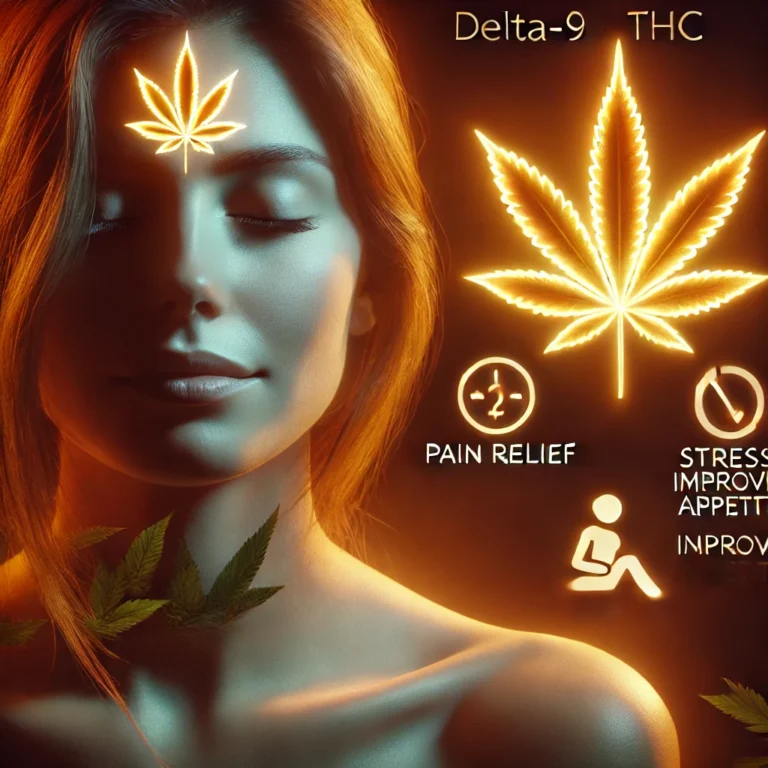Delta-9, or delta-9-tetrahydrocannabinol (Δ9-THC), is the primary psychoactive compound found in cannabis. It is responsible for the “high” that users experience and plays a crucial role in both recreational and medicinal cannabis use. But beyond its psychoactive effects, Delta-9 offers numerous therapeutic benefits, making it a subject of significant scientific research and consumer interest.

Delta-9 interacts with the body’s endocannabinoid system (ECS), specifically binding to CB1 receptors in the brain and central nervous system. This interaction triggers the release of neurotransmitters that affect mood, pain perception, appetite, and cognition. Unlike CBD, which has a more indirect effect on the ECS, Delta-9 directly influences these receptors, leading to its potent psychoactive properties.
Although Delta-9, Delta-8, and Delta-10 are all forms of THC, their molecular structures and effects differ slightly:
| THC Variant | Psychoactivity | Binding Affinity | Effects |
|---|---|---|---|
| Delta-9 | Highly psychoactive | Strong CB1 binding | Euphoria, relaxation, appetite stimulation |
| Delta-8 | Mildly psychoactive | Moderate CB1 binding | Less intense high, more focus and calmness |
| Delta-10 | Mildly psychoactive | Weaker CB1 binding | Energetic, uplifting effects |
The placement of the double bond in their chemical structure affects how they bind to CB1 receptors, resulting in varying intensities of psychoactive effects.

Research has highlighted several potential benefits of Delta-9, including:
Pain Relief: Studies suggest Delta-9 can help alleviate chronic pain by interacting with pain receptors in the brain.
Appetite Stimulation: Often used by cancer patients undergoing chemotherapy, Delta-9 is well-known for increasing appetite.
Anxiety & Stress Reduction: Low doses of Delta-9 may help reduce anxiety, although higher doses can sometimes have the opposite effect.
Neuroprotection: Some studies indicate that Delta-9 may have neuroprotective properties, potentially benefiting conditions like Alzheimer’s disease.
Different consumption methods affect the potency, onset time, and duration of Delta-9’s effects. Here’s a breakdown:
| Method | Onset Time | Duration | Pros | Cons |
| Smoking/Vaping | 5-10 minutes | 2-4 hours | Fast onset, high bioavailability | Harsh on lungs, short-lived effects |
| Edibles | 30-90 minutes | 6-8 hours | Long-lasting, discreet | Slow onset, harder to dose |
| Tinctures | 15-45 minutes | 4-6 hours | Faster than edibles, sublingual absorption | Taste can be strong, some absorption variability |
| Topicals | No psychoactive effects | Varies | Great for localized pain, non-intoxicating | Limited to surface-level relief |
One of the most common questions I hear is, “Is Delta-9 legal in Texas?” The answer depends on the source of Delta-9 and state regulations. Under the 2018 Farm Bill, hemp-derived Delta-9 THC is federally legal as long as it contains no more than 0.3% THC by dry weight. However, state laws vary, and Texas has its own regulations regarding cannabis-derived products. Currently, hemp-derived Delta-9 products are legal in Texas under these federal guidelines, but marijuana-derived Delta-9 remains illegal except for limited medical use. Always check the latest Texas laws before purchasing Delta-9 products to ensure compliance.

Delta-9 interacts with the body’s endocannabinoid system (ECS), specifically binding to CB1 receptors in the brain and central nervous system. This interaction triggers the release of neurotransmitters that affect mood, pain perception, appetite, and cognition. Unlike CBD, which has a more indirect effect on the ECS, Delta-9 directly influences these receptors, leading to its potent psychoactive properties.
Although Delta-9, Delta-8, and Delta-10 are all forms of THC, their molecular structures and effects differ slightly:
| THC Variant | Psychoactivity | Binding Affinity | Effects |
|---|---|---|---|
| Delta-9 | Highly psychoactive | Strong CB1 binding | Euphoria, relaxation, appetite stimulation |
| Delta-8 | Mildly psychoactive | Moderate CB1 binding | Less intense high, more focus and calmness |
| Delta-10 | Mildly psychoactive | Weaker CB1 binding | Energetic, uplifting effects |
The placement of the double bond in their chemical structure affects how they bind to CB1 receptors, resulting in varying intensities of psychoactive effects.
Delta-9 is the most well-known THC variant, responsible for cannabis’s psychoactive effects.
It interacts directly with CB1 receptors, affecting mood, pain, and appetite.
Compared to Delta-8 and Delta-10, Delta-9 is more potent but shares some similar properties.
Scientific research supports its use for pain relief, appetite stimulation, and anxiety management.
Different consumption methods impact onset time, duration, and overall experience.
Join our community of cannabis enthusiasts and terpene explorers! Get exclusive insights, in-depth guides, and the latest discoveries. No spam—just pure, aromatic knowledge delivered straight to your inbox.
Subscribe now and elevate your cannabis wisdom!